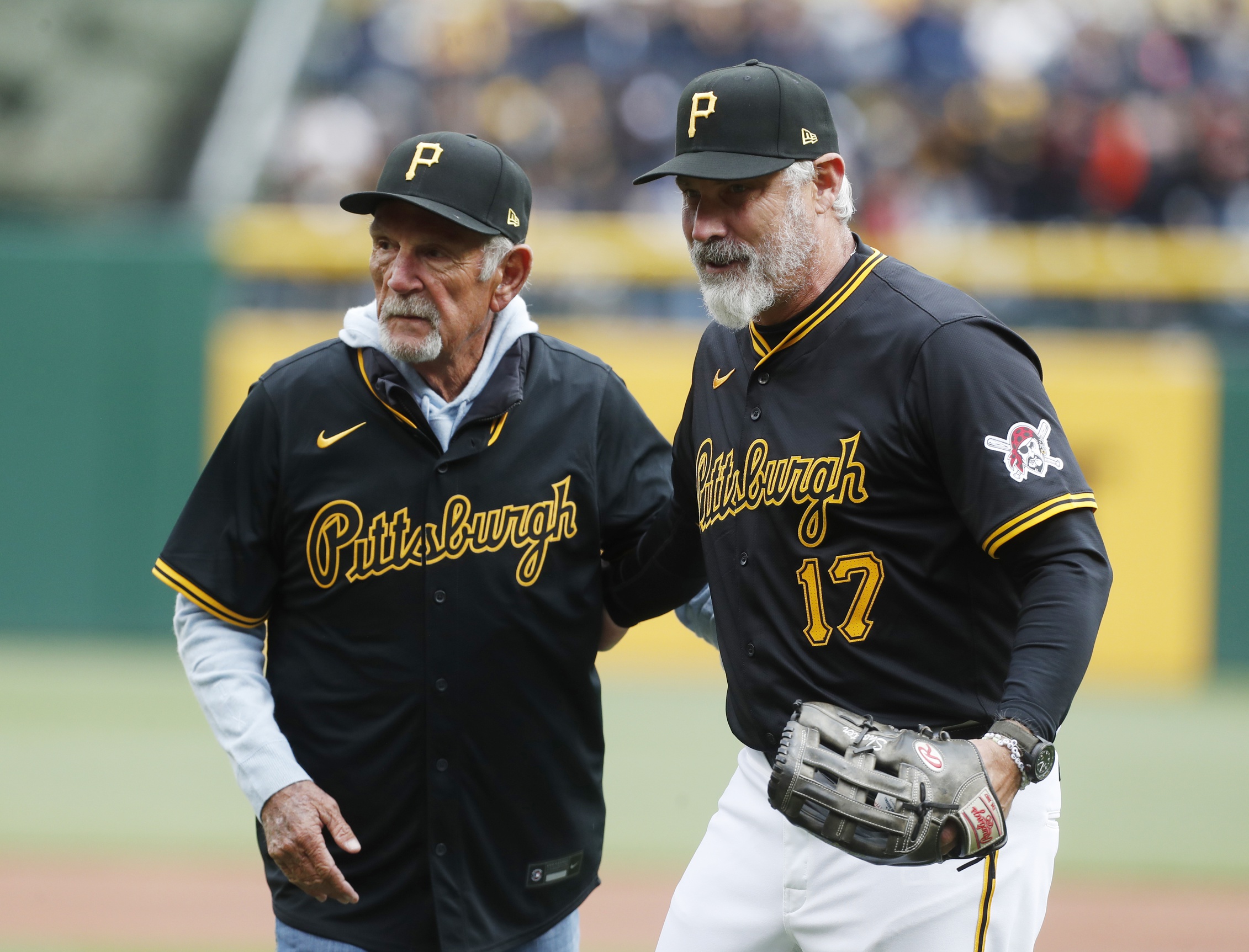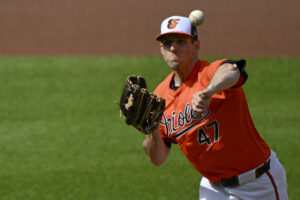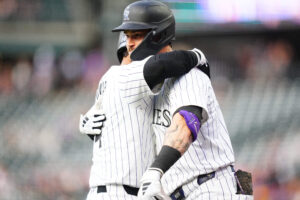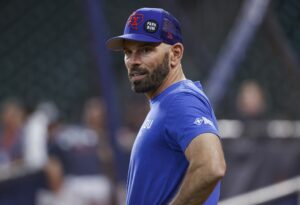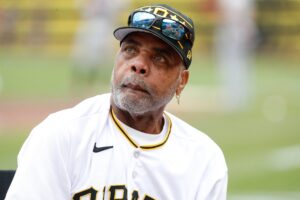You read that right, but first, former Pittsburgh Pirates manager Jim Leyland will enter the Hall of Fame on Sunday. He’ll be inducted along with Adrián Beltré, Todd Helton, and Joe Mauer.
Hall of Fame Manager Jim Leyland: Five Moments
During his 22-year managerial career, Leyland managed the Pirates (1986-96), Florida Marlins (1997-98), where he earned a World Series ring, Colorado Rockies (1999), and Detroit Tigers (2006-13), where he won two American League pennants. Here is one man’s opinion on the highlights and lowlights of his time with the Pirates. They’re listed in no particular order.
November, 1985. Jim Leyland becomes a MLB manager for the first time, inheriting a Pirates team that had gone 57-104 the previous season.
38 years later, he’s a Hall of Famer. pic.twitter.com/qx0LLlLcQQ
— Ryan Recker (@RyanRecker) December 4, 2023
Three Good Moments
Leyland Stands Up to Bonds
Barry Bonds was upset. For the second year in a row, he had lost his arbitration hearing. All he did in 1990 was win his first National League Most Valuable Player Award. For 1991, he wanted a salary of $3.25 million. The arbitrator sided with the Pirates, who offered $2.3 million. Bonds told a reporter that if he lost, “Don’t try to talk to me. It won’t be good.” Bonds showed up to spring training, sulking and unhappy, refusing to speak to the media. On March 4, Bonds screamed at photographers who tried to take his picture. It spilled over into an argument between Bonds and special instructor Bill Virdon, as Virdon was trying to explain a drill to a gathering of outfielders.
That’s when Leyland stepped in and launched an obscenity-laced tirade against his young superstar. It was all caught on video. The following is not safe for work or in the presence of children or clergy.
Afterward, Leyland told Bob Hertzel of The Pittsburgh Press, “For any club the most important thing is discipline first, then talent second. You have to have everyone on the club trying to accomplish what you want done.” Many would put Leyland in the Hall of Fame based on this moment alone.
How to Use a Bullpen
It was an insignificant game between two teams who would finish in last place in their divisions. The Pirates were soundly defeated by the Atlanta Braves, 9-4, on Memorial Day, 1986 at Three Rivers Stadium. But one moment showed anybody who was paying attention that as a tactician, Leyland could match wits with any manager. It was the eighth inning and the Braves had scored five runs, thanks largely to four errors, to take an 8-4 lead. At last, there were two outs. Atlanta had a runner on second and right-handed slugger Bob Horner due up. Leyland went to the bullpen to get left-hander Pat Clements. Clements issued an intentional walk to Horner. With the left-handed-batting Gerald Perry due up, Braves manager Chuck Tanner sent the right-handed Terry Harper to pinch hit. Leyland went to the bullpen again and countered with righty Cecilio Guante, who struck Harper out.
The fans booed as Leyland removed Clements, but it was a stroke of genius. Looking ahead, Leyland had decided he would get out of the inning with Perry’s spot in the order. If Tanner pinch hit, Leyland could change pitchers. Most managers would have the pitcher issue the intentional pass before going to the bullpen. Then the reliever is forced to face whoever the opposing manager chooses. This way, it was the future Hall of Fame manager Leyland who chose the match-up.
Today, pitchers must face a minimum of three batters, making the above strategy moot.
Kingery’s Pinch-Hit Grand Slam
It was another game destined to go down in the annals of irrelevant history when the Pirates hosted the Montreal Expos on July 23, 1996. It was the major league debut of 24-year-old center fielder Jermaine Allensworth. He had earned a call-up because he was hitting .330 and playing great defense for Triple-A Calgary. Hitting seventh in the order, Allensworth had struck out twice when his turn came again in the bottom of the sixth with the bases loaded and one out. This time, Leyland sent up veteran Mike Kingery to pinch-hit for the rookie. Kingery drove Pedro Martínez’s 1-0 pitch over the right-field wall for a grand slam. It broke a 1-1 tie and sent the Pirates to a 5-1 win.
Leyland explained to Paul Meyer of the Pittsburgh Post-Gazette, “You can let (Allensworth) hit to instill a little confidence. But if something good doesn’t happen, that can have an (adverse) effect.”
Three Bad Moments
Kingery’s Pinch-Hit Grand Slam
No, the reader isn’t experiencing déjà vu. But yes, we’re talking about the same game here. When owner Kevin McClatchy was lobbying for PNC Park, he argued that it was necessary to hang on to the young players who would become cornerstones of the Pirates’ future success and named Allensworth as one of them. In sending Kingery to hit, Leyland likely knew that Allensworth wasn’t headed to the Hall of Fame. Indeed, Allensworth was a useful, but not great, major league player. In four seasons for three teams, he hit .260/.339/.367. Regardless, at the time it was important to expose Allensworth to clutch situations. The incident showed Leyland wasn’t interested in rebuilding again in Pittsburgh and was a precursor to his September 17 announcement that he would be leaving the team after the season.
Merced’s Sacrifice Bunt
Now we go to the 1991 National League Championship Series between the Pirates and Braves. The Pirates led the series, 3-2, and were headed home to host the last two games, needing to win only one. Not only did the Pirates lose both games, they didn’t score a single run.
In Game 6, the Pirates were trailing, 1-0, going to the bottom of the ninth. The Braves’ right-handed fire-balling closer, Alejandro Peña, was on the mound. Gary Varsho, pinch-hitting in the pitcher’s spot, led off with a line-drive single to center. At the top of the order, switch-hitting Orlando Merced was ordered to sacrifice bunt.
Of course, the sacrifice bunt is the most overrated, overused ploy in sports. According to a study by Baseball Analysts, a runner on first with no outs scores far more frequently than a runner on second with one out. Based on data from 1977-92, the run expectancy with a runner on first and no outs is .877. With a runner on second and one out, the run expectancy decreases to .693. More simply, the math doesn’t work. There are three bases to advance to score a run and three outs to work with. Trading an out for a base won’t lead to a run unless a batter gets a hit. The chances of a hit are better if three batters try for it than if two batters try.
Nevertheless, Merced successfully sacrificed. Next was a right-handed batter, Jay Bell, who had no chance against the hard-throwing Peña. After Bell was Andy Van Slyke, who hit .160 in that Series; he had no chance against anybody. Bell flew out to right field, Van Slyke struck out, and the rest is history. Better to have taken a shot with Merced, who hit .285 against righties in 1991.
Where was “Llegendary Lloyd?”
Lloyd McClendon was the proverbial 25th man. He’s better known as the manager of three major league teams after his playing days were over. The Mets drafted him, then traded him to get Tom Seaver back. McClendon was a first baseman/corner outfielder/catcher who batted right-handed and hit .244/.325/.381 for his eight-year career. He was a Leyland favorite despite having even lesser chances of making the Hall of Fame than Allensworth.
However, McClendon did one thing very well. He murdered Atlanta’s left-handed pitching. For his career against the Braves’ left-handed starters Tom Glavine, Steve Avery, and Charlie Leibrandt, “Llegendary Lloyd” hit .320/.414/.427. Yet in the 1991 NLCS, Leyland gave McClendon just three plate appearances. This, although the heart of the Pirates’ order was more like a collapsed lung. For the NLCS of 1990 and 1991, Van Slyke, Bonds, and Bobby Bonilla hit a combined .196/.311/.290. They could have used McClendon in the outfield against Atlanta’s lefties, even if meant sitting out Bonds or Bonilla. Or he could have replaced Gary Redus at first base. Redus hit .246/.324/.393 in the regular season and just .158 in the NLCS. Instead, Leyland kept McClendon on the bench.
When Bonilla departed for free agency in 1992, McClendon saw action in five NLCS games against the Braves. He hit .727/.750/1.182.
In Person and on TV
The Hall of Fame will induct Leyland and the others at 1:30 Eastern Time at the Clark Sports Center in Cooperstown. It will be broadcast live on the MLB Network.
Photo Credit: © Charles LeClaire-USA TODAY Sports


